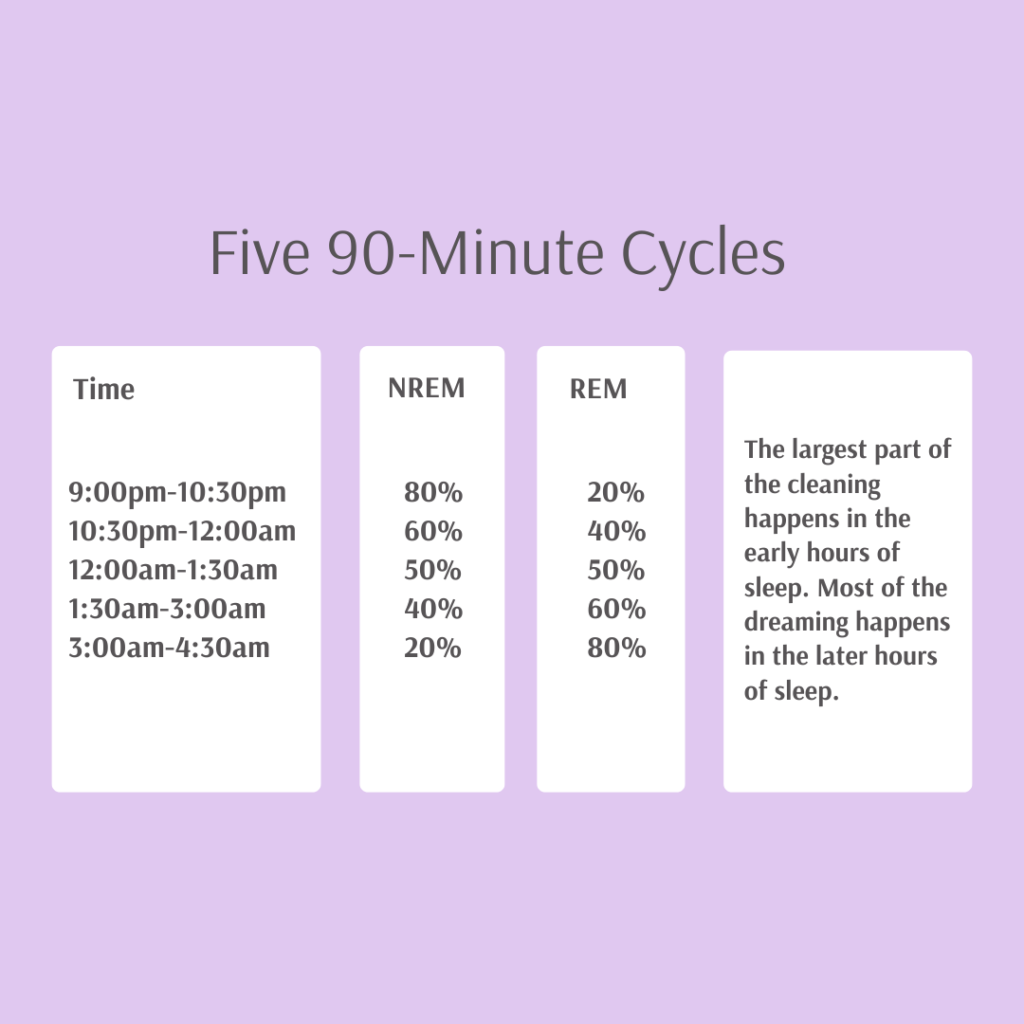Hey everyone! I trust you had a fantastic week and managed to put into practice some of the tips we discussed for improving your sleep. If you did, I’d love to hear about your experiences and if there’s anything I can assist you with along the way. Engaging with the material and troubleshooting with applications to your personal situation will help shape your journey to better rest, reduction of cortisol levels and overall well-being.
Now, let’s dive into the fascinating world of sleep cycles. Did you know that sleep isn’t just a uniform state of rest throughout the night? It actually consists of two main types of sleep, each with its own distinct characteristics and benefits. As the hours of the night progress, these sleep stages alternate in a beautifully orchestrated rhythm, contributing to our overall sleep quality and restoration. So, let’s explore these sleep stages and how they work together to promote optimal rest and rejuvenation.
So, let’s do a quick recap before we dive deeper. Sleep, a divine gift from God, works wonders in reviving and restoring our bodies and minds. It’s during this precious time that healing occurs at an accelerated rate, rebuilding what’s been worn down throughout the day. You also have the power to optimize your sleep by fine-tuning your bedtime routine to maximize the release of essential hormones, ensuring you reap the full benefits of a good night’s rest. If you missed the last post on sleep, you can read it here.

Now, let’s venture further into the realm of sleep. In Isaiah 30, God reminds us of the importance of repentance, rest, quietness, and trust. These elements are key to unlocking the strength and rejuvenation that come with quality sleep. Today, we’ll delve into the fascinating world of sleep cycles, exploring the two main types: rapid eye movement (REM) and non-rapid eye movement (NREM) sleep. While REM sleep is associated with dreaming and fostering creativity, NREM sleep plays a crucial role in consolidating daily learning and clearing out mental clutter, including negative emotions. By embracing forgiveness and relinquishing our worries to God, we pave the way for deeper, more restorative sleep. And the beauty of it all? Sleep offers benefits that no amount of striving or worrying can ever match. So, let’s journey together as we uncover the secrets to a truly rejuvenating slumber.
Let’s break down the REM (rapid eye movement) cycle first. Maybe you’ve noticed someone asleep and their eyelids fluttering? That’s REM in action, the stage where dreams unfold. But it’s not just dreams that happen during this time; it’s also a time for mental organization. Think of it as your brain’s filing system, sorting the day’s events into positive and negative folders while generating fresh ideas and creative solutions. So, yes, sleep literally fuels our creativity and problem-solving abilities, offering insights we might miss while staying awake, lost in worry. Plus, REM sleep acts as a mental save button, consolidating our daily learning like a digital backup.
The other cycle, NREM (non-rapid eye movement) sleep is the more tranquil phase of slumber. During NREM sleep, short-term memories are transferred to long-term storage in the cortex, similar to tidying up your mental space. It’s like having a cleaning crew for your brain, clearing out neuronal waste and negative emotions accumulated throughout the day. Forgiveness plays a pivotal role for this cycle. By choosing to forgive, even if our emotions aren’t fully on board yet, we kickstart the process of emotional cleansing. This release triggers our lymphatic system to remove the toxic buildup, paving the way for inner peace and emotional healing. So, the next time you struggle with forgiveness, remember that by extending grace, you’re not just lightening your heart but also giving your body the green light to cleanse itself. This doesn’t mean all is well right away. Forgiveness is both a decision and a process, but we can start it by setting an intention to at least start that process before we go to sleep.
If you’ve tracked with me so far, then you might be really fascinated by diving deeper into the fascinating rhythm of sleep cycles and their impact on memory consolidation and mental cleansing. These cycles operate in 90-minute intervals, with the first cycle occurring between 9:00 PM and 10:30 PM if bedtime starts at 9:00 PM (which experts say is optimal). During this initial phase, about 80% of the time is dedicated to transferring short-term memories to long-term storage, while the remaining 20% is allocated for dreaming and idea generation. This highlights the importance of allowing the brain’s cleaning crew ample time to tidy up before moving on to the next phase.

Going to bed later, such as by midnight, significantly reduces the duration of the cleaning phase, potentially leaving short-term memories unconsolidated. As a result, individuals may wake up feeling mentally cluttered, hindering their ability to learn and retain information effectively. Research indicates that subjects who consistently slept for eight hours retained nearly double the amount of information compared to those who only slept six hours. This underscores the critical role of sleep duration in maximizing the consolidation of learning materials. Therefore, aiming for a full eight hours of sleep ensures the completion of five complete 90-minute cycles, allowing sufficient time for both memory consolidation and mental rejuvenation.
By consciously creating an environment conducive to optimal sleep, such as establishing a consistent bedtime routine and practicing forgiveness to alleviate emotional burdens, we empower our bodies to undergo thorough mental cleansing during sleep, leaving us with a refreshed and decluttered mind to tackle the challenges of the day ahead. Prioritizing our sleep and giving ourselves the gift of a clean slate each morning sounds more and more appealing!
While studies suggest that eight hours is the optimal amount of sleep for most individuals, it’s essential to listen to your body’s unique needs. Some people, like myself, find that they naturally gravitate towards a slightly longer sleep duration, such as nine hours on average. Although this may include brief waking periods throughout the night, providing a bit of extra sleep time can offer additional benefits, potentially enhancing memory consolidation and overall cognitive function. So, while eight hours is the benchmark, don’t hesitate to adjust your sleep routine based on what feels best for you. After all, quality sleep is key to unlocking our full potential during waking hours!
One simple method to discovering your body’s optimal sleep duration is to count nine hours backward from the time you typically need to wake up and make that your bedtime. If you find yourself waking up naturally before the nine-hour mark, you may find that 8.5 hours of sleep is ideal for you. Conversely, if you still rely on an alarm to wake up after nine hours, your body might benefit from a bit more rest. Keep in mind that individual sleep needs can vary based on factors like adrenal fatigue that may temporarily increase your need for sleep. As you address any underlying health issues and restore balance, your sleep requirements may naturally adjust. By tuning into your body’s signals and honoring its unique needs, you can cultivate a sleep routine that fosters optimal health and vitality.
Understanding the benefits of good sleep habits goes beyond just feeling refreshed in the morning. Did you know that while you sleep, your body does some serious housekeeping, including clearing out amyloid plaque? This plaque is linked to Alzheimer’s and dementia, so ensuring your body has ample time to perform this essential cleanup is crucial. Please remember that while sleep alone can’t fix and prevent all things, it’s a crucial component for healing and preventing many other health issues.
Since healing occurs at double the rate during sleep, with the hours before midnight being especially valuable, prioritizing a bedtime routine that allows for optimal rest, is a necessary component for achieving physical health. You’re also setting the stage for clearer thinking and better decision-making throughout the day. So, why not give your brain the advantage it deserves?
It’s easy to underestimate the power of a good night’s sleep, but the truth is, your body’s maintenance crew works wonders while you’re in dreamland. By respecting your body’s need for rest and creating healthy sleep habits, you’re giving yourself the gift of enhanced cognitive function, improved memory consolidation, and reduced risk of cognitive decline. So, the next time you’re tempted to burn the midnight oil, remember that your brain will thank you for hitting the hay a little earlier. After all, a well-rested mind is your greatest asset in the pursuit of overall health and well-being.

When it comes to implementing what you’ve learned, it’s natural to feel overwhelmed by the many options available. Instead of spreading yourself too thin, I encourage you to choose one action step that resonates most with you or select one of the suggestions below. Remember, progress comes from consistent, small steps rather than overwhelming yourself with too much at once.
- Set a bedtime alarm: Set a reminder to start winding down and prepare for bed at a consistent time each night. Consistency can improve sleep quality over time.
- Create a bedtime routine: Establishing a relaxing pre-sleep routine, such as reading a book, practicing deep breathing exercises, or taking a warm bath etc. can be really helpful. Consistent bedtime rituals can signal to the body that it’s time to wind down.
- Practice forgiveness: Remember the emotional benefits of forgiveness. Take a few minutes before you go to bed to scan through your day and listen if any offenses or hurts are coming up. Finish your time by asking God to help you let go as you choose to start the process of forgiving whoever was involved.
- Explore further resources: Do some of your own research, if one topic or study intrigued you by looking up additional articles, books, or podcasts on sleep hygiene, forgiveness, and overall health and well-being. Continue learning and exploring ways to prioritize your health.




